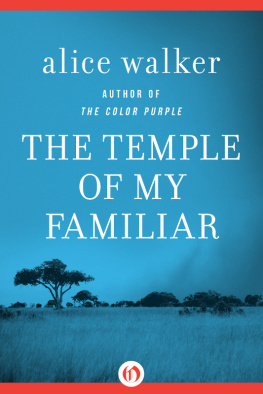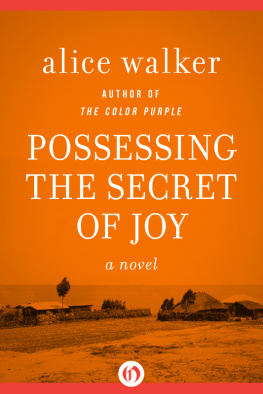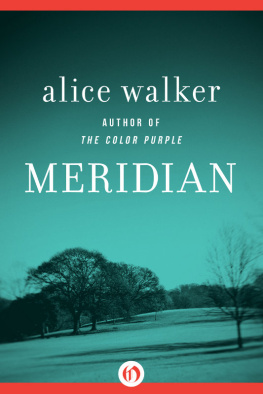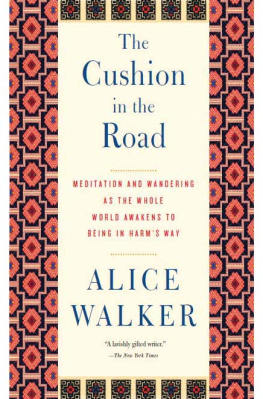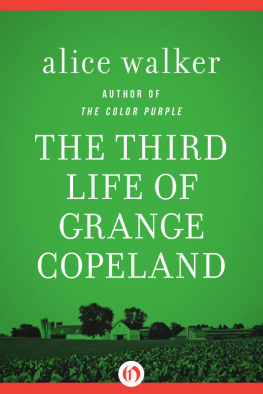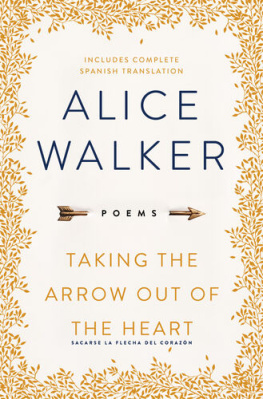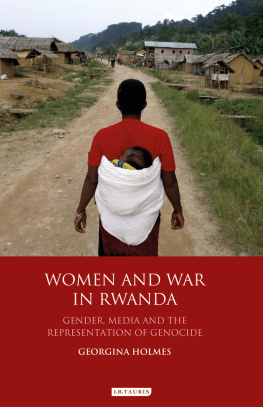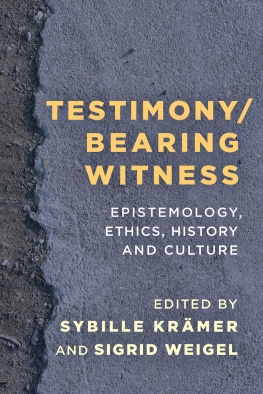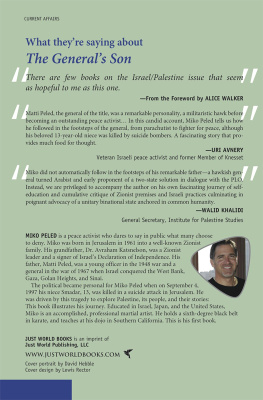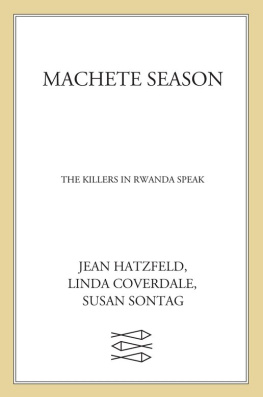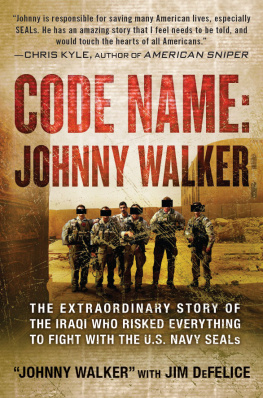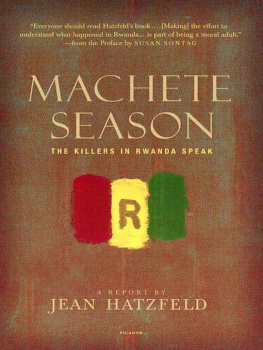ABOUT THE AUTHOR
Alice Walker has published seven books of poetry: Once; Revolutionary Petunias; Good Night, Willie Lee, Ill See You in the Morning; Horses Make a Landscape Look More Beautiful ; Her Blue Body Everything We Know: Earthling Poems 1965-1990 Complete (with previously unpublished poems); Absolute Trust in the Goodness of the Earth; and A Poem Traveled Down My Arm: Poetry and Drawings. Her eighth collection, Hard Times Require Furious Dancing: A Year of Poems, will be published in 2010. She has received numerous awards for her poetry and essays. Her novel The Color Purple won the Pulitzer Prize for Fiction in 1983.
Overcoming Speechlessness, discussing the trauma of disaster, sorrow, and loss always returns her to the writing of poetry, her first love and most enduring joy.
www.alicewalkersgarden.com
SUGGESTED READING, LISTENING, VIEWING
To the Editors of Ms. Magazine, in my book In Search of Our Mothers Gardens: Womanist Prose, 1983. This is an essay/memo written a few weeks prior to the Israeli invasion of Lebanon and a few months before the Beirut massacres, in response to an article by Letty Cottin Pogrebin, Anti-Semitism in the Womens Movement, which appeared in the June 1982 issue. I am writing about my refusal, as a woman of color, to be silenced and how black history supports this stance.
My interview in Gaza with reporters from Democracy Now! on YouTube.
Sister Loss, an essay about the bombing of Gaza that appears on my blog: www.alicewalkersblog.com
Palestine: Peace Not Apartheid by President Jimmy Carter.
One Country: A Bold Proposal to End the Israeli-Palestinian Impasse by Ali Abunimah (probably the most important book to read on Palestinian/Israeli issues at this time). Abunimah gives a remarkably balanced account of Palestinian/Israeli history, as well as a convincing argument for choosing a one-state solution.
Palestine Inside Out: An Everyday Occupation by Saree Makdisi is a must read, but on a day when the reader is feeling strong. For this reader it brought almost too close memories of growing up in the American South, in the fifties and early sixties, when any white person could demand that you get off the sidewalk.
A Peoples History of the United States by Howard Zinn. Israel learned a lot of its behavior from America; this vital resource illustrates this.
A wide selection of Noam Chomskys teachings on Israel and Palestine on YouTube.
The writings and taped lectures of Edward Said.
Interviews with Israeli soldiers on YouTube, Alternate Focus, AlterNet, World Focus, the BBC, and Democracy Now!
Movies: The Battle of Algiers, 1966, and Waltz With Bashir, 2009.
ABOUT SEVEN STORIES PRESS
Seven Stories Press is an independent book publisher based in New York City, with distribution throughout the United States, Canada, England, and Australia. We publish works of the imagination by such writers as Nelson Algren, Russell Banks, Octavia E. Butler, Ani DiFranco, Assia Djebar, Ariel Dorfman, Coco Fusco, Barry Gifford, Lee Stringer, and Kurt Vonnegut, to name a few, together with political titles by voices of conscience, including the Boston Womens Health Collective, Noam Chomsky, Angela Y. Davis, Human Rights Watch, Derrick Jensen, Ralph Nader, Gary Null, Project Censored, Barbara Seaman, Alice Walker, Gary Webb, and Howard Zinn, among many others. Seven Stories Press believes publishers have a special responsibility to defend free speech and human rights, and to celebrate the gifts of the human imagination, wherever we can. For additional information, visit www.sevenstories.com.
1. THREE YEARS AGO
Three years ago I visited Rwanda and eastern Congo. In Kigali I paid my respects to the hundreds of thousands of infants, toddlers, teenagers, adolescents, young engaged couples, married people, women and men, grandmothers and grandfathers, brothers and sisters of every facial shape and body size, who had been hacked into sometimes quite small pieces by armed strangers, or by neighbors, or by acquaintances and friends they knew. These bodies and pieces of bodies are now neatly and respectfully buried in mass graves. Fifteen years ago these graves were encircled by cuttings of plants that are now sturdy, blossoming vines that cover their iron trellises with flowers. Inside the adjacent museum there are photographs of the murdered: their open smiles or wise and consoling eyes will remain with me always. There is also, in the museum, a brief history of Rwanda. It tells of the long centuries Tutsi and Hutu lived together, intermarrying and raising their children, until the coming of the Belgians in the 1800s. (Before the Belgians, the territory had been colonized by the Germans.) The Belgian settlers determined with the measurements of Hutu and Tutsi skulls that the Tutsi were more intelligent than the Hutu, more like Europeans, and therefore placed the Tutsi above the Hutu. Over a hundred years later, when the Belgian colonists left for Europe, and after many changes to each of these groups, they left the Hutu in charge. The hatred this diabolical decision caused between these formerly coexisting peoples festered over generations, coming to a lethal boil in the tragedy of genocide.
I had done research while in college and written a thesis of sorts on the Belgian Congo, where King Leopold of Belgium introduced the policy of cutting off the hands of enslaved Africans who didnt or couldnt fulfill their rubber quota. They were collecting latex for the rubber that made tires for the new cars everyone was beginning to want in America and Europe; I had not known that these same activities had spread into the Kingdom of Rwanda. To the Belgians, apparently, and to the German colonialists before them, it was all one vast empty territory to be exploited without any consideration for the people living there. Indigenous Africans didnt seem to exist, except as slaves.
While visiting the set for the film The Color Purple, many decades after college, a sad older man from Africa, who had been a doctor in the Congo and was now hired as an extra for our film, lamented the loss of his country, his people, and his land, telling me that the Firestone Corporation had taken millions of acres of land, leasing it for pennies an acre, in perpetuity. The people whod lived there since the beginning of humanity had been forced to tend the trees planted there on Firestones vast rubber tree plantation. I immediately thought of every car Id owned and all the tires that ran under them.
2. FROM KIGALI
From Kigali and meetings with survivors, witnessing their courage and fortitude, their willingness to move on and beyond unspeakable tragedy, I went to eastern Congo. There I met with women still victimized by the killers of Kigali, who had been chased across the border into their country. These women had been the victims of rape on so large a scalerape as one of the cruelest weapons of warit seemed impossible they had not, in their despair, chosen to destroy themselves. Their villages had frequently turned against them because of the abuse they had experienced; if their husbands were still alive, they regularly dismissed them, refusing them shelter in their own homes.
One beautiful woman, who came to meet me wearing white and purple, had been a sex slave in the bush for over a year, forced to carry loads that bent her double, her eyes repeatedly struck to damage her vision so that she would not be able to identify her assailants, her whole body beaten until, over a year later, there was still a discernible limp when she attempted to walk with what one assumed was her former grace. We embraced each other with tears, and with joy. I was more thankful to see her radiant resurrection than I had been to witness anything in my life. She had been raped with every imaginable instrument, including machete handles and gun barrels. Thanks to you, my sisters of Women for Women International, she said, I have come through. Many of us have come through. We will not go back. We will not be slaves and beasts of burden.


